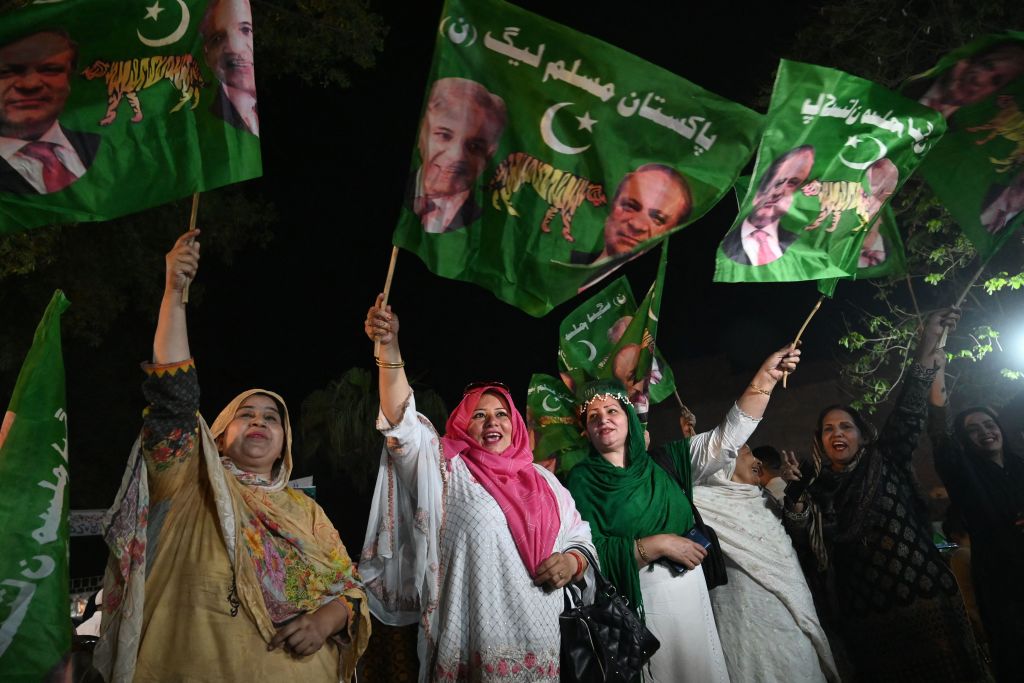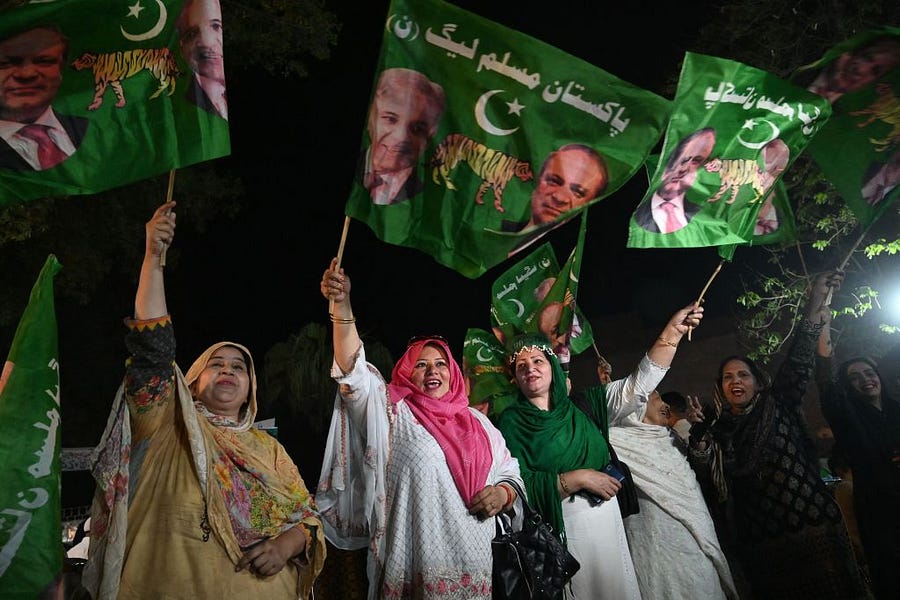Happy Tuesday! We’re working on getting prizes shipped out to the TMD March Madness Bracket winners, but we need some more information from a couple top finishers. If your ESPN username is ku1998, MercuryII, denmalloy, espn23983092, toherndon, ESPNFAN63984187, cregan1312, Gtpj777, ClaraWrestler, or sleepytown, please reply to this email with three things:
-
Your shipping address;
-
Your preferred prize between a TMD mug, Dispatch hat, and Dispatch T-shirt (include your size if the latter); and
-
Proof that you own one of the winning brackets (attach a screenshot like below).

[Editor’s note: Let’s have a quick round of applause for Declan, whose bracket came in a very respectable 670th place.]
Quick Hits: Today’s Top Stories
-
One day after ousting Imran Khan as prime minister in a no-confidence vote, Pakistan’s parliament voted Monday to elect Shehbaz Sharif—younger brother of three-time Pakistani prime minister Nawaz Sharif—to the role. The younger Sharif has experience governing Pakistan’s largest province, and said he plans to repair Pakistan’s relationship with the United States—which Khan claims, without evidence, was behind his ouster.
-
Philadelphia’s Department of Public Health announced Monday the city will reimplement its mask mandate for indoor public places beginning April 18, becoming the first major city to do so in response to rising COVID-19 case counts this spring. Philadelphia County is seeing an average of 149 new cases each day, up from 80 per day two weeks ago but still significantly below the city’s Omicron peak of nearly 4,000 per day.
-
Seven months after withdrawing his first nominee to lead the Bureau of Alcohol, Tobacco, Firearms, and Explosives (ATF), President Joe Biden announced Monday he will nominate Steve Dettelbach—a former U.S. Attorney from Ohio—for the position. The Justice Department also issued a new rule on Monday targeting so-called “ghost guns” by subjecting “parts kits that are readily convertible to firearms” to the same regulations as traditional firearms.
-
Days after updating its guidance to allow non-emergency personnel and family members to leave its consulate in Shanghai due to the Chinese government’s response to rising COVID-19 cases, the U.S. State Department on Monday issued an updated travel advisory ordering them to depart.
Pakistan Swaps Prime Ministers

Pakistan has had more than 20 prime ministers since its founding in 1947, and—due to a combination of assassinations, military coups, forced resignations, and the dissolutions of government—not a single one of them has served out the entirety of his or her full five-year term. It’s time to reset the clock once again.
The streak will now remain intact until at least 2027, as Imran Khan—elevated to prime minister in 2018—was ousted on Sunday in an incredibly tight vote of no confidence. The move has been several weeks in the making, but was temporarily put on hold earlier this month after Khan triggered a constitutional crisis by dissolving Pakistan’s National Assembly moments before the body was set to vote on his expulsion. The country’s Supreme Court overturned the move last Thursday, setting the stage for this weekend’s referendum. The resolution passed with 174 votes, just two more than necessary in the 342-member chamber. Shehbaz Sharif—opposition leader and younger brother of three-time Pakistani Prime Minister Nawaz Sharif—was elected as Khan’s replacement on Monday with the exact same number of votes.
The State Department has categorically denied Khan’s claims that the United States conspired with opposition politicians to take him down, but the populist Islamist leader keeps leveling the accusation anyway. “Pakistan became an independent state in 1947; but the freedom struggle begins again today against a foreign conspiracy of regime change,” he tweeted over the weekend. Tens of thousands of Khan’s supporters have protested in Pakistan’s streets in recent days, and members of his Pakistan Tehreek-e-Insaf (PTI) party resigned from parliament and walked out ahead of the vote to elect Sharif.
How did the country get to this point? An international cricket star in the 1970s and 1980s, Khan leveraged his celebrity status in the mid-1990s to found the PTI party, gradually building up a coalition over the ensuing two decades. Pitching himself to voters as an outsider ready to take down corrupt politicians, he finally consolidated enough support to become prime minister in 2018. But it’s been a bumpy road ever since.
Khan frustrated opposition politicians by, as they saw it, pursuing corruption charges selectively—against them, but not his friends and allies. He alienated Pakistan’s politically powerful military, butting heads over leadership appointments and charting a divergent foreign policy and defense strategy. Pakistan adopted a more hostile stance toward the United States under Khan, with the prime minister denouncing Pakistan’s past policy of partnering with Americans on antiterrorism efforts and accusing the Biden administration of leaving U.S.-created problems on Pakistan’s doorstep by withdrawing from Afghanistan last summer. The United States, meanwhile, has long accused Pakistan of providing safe harbor for the Taliban.
In addition to his clashes with the military, mismanagement of the economy is what ultimately did Khan in. He inherited some inflation—and COVID-19 didn’t help—but his erratic governance often spooked the market. In March 2021, for example, his government decided to allow cotton and sugar imports from India, only to backtrack weeks later. He promised economic independence, then decided to take a bailout from the International Monetary Fund, later jeopardizing those payments by declaring energy subsidies and tax amnesty policies without approval from the IMF.
In the agricultural sector, critics argue Khan’s government contributed to rising food prices by neglecting to support farmers with machinery upgrades or subsidies. “The government plays a big role in agricultural markets in Pakistan,” Uzair Younus, director of the Atlantic Council’s Pakistan Initiative, told The Dispatch. “That’s where they bear the blame.” Year-over-year inflation hit 12.2 percent in February, and a January Gallup Pakistan poll found about 60 percent of Pakistanis considered rising prices to be the country’s biggest problem. In the days leading up to last week’s no-confidence vote, the Pakistani rupee hit an all-time low against the U.S. dollar.
Khan was more talk than action. Rather than showing up to parliamentary assemblies to hash out policy plans, he preferred appearing on his favorite television networks to give “long meandering speeches about how everybody who was against him was horrible,” former Pakistani ambassador to the U.S. Husain Haqqani told The Dispatch. “This was just government by gimmickry, and government by gimmickry does not sit well with serious people.”
Sharif, the new prime minister, is in some ways Khan’s polar opposite. He’s from one of the few families that has dominated Pakistan’s politics for decades, and unlike his older brother Nawaz—the three-time prime minister now in self-imposed exile to avoid imprisonment for corruption convictions—he’s not known for being especially charismatic. But three terms as chief minister of Punjab—Pakistan’s most populous province—earned Sharif a reputation as a workaholic with the administrative chops to get things done. “If we are to save the sinking ship that is this country, it will require effort, effort, and more effort,” Sharif said in a speech after his election.
Pakistan’s next general election is scheduled to be held in the fall of 2023, but Sharif’s party will likely opt to call one well before then, possibly as soon as this October. That doesn’t leave Sharif much time for all that effort, effort, and more effort. He’s promised to raise minimum wages and push forward a multibillion-dollar infrastructure deal with China.
Sharif will need to tread carefully in his relationship with the United States. Khan has already accused him of being a “slave of America,” and any high-level outreach to the U.S. could be viewed domestically as a vindication of claims the U.S. plotted against Khan as punishment for his friendliness with Russia and China. Khan was in Moscow meeting with Russian President Vladimir Putin just hours before the latter officially launched his invasion of Ukraine, an act of aggression Pakistan’s former leader has refused to condemn. Pakistan embraced China’s Belt and Road Initiative under Khan, accepting economic support for infrastructure projects like railway and port upgrades despite U.S. warnings the initiative relies on predatory loans from China.
No matter what tack Sharif takes, Khan will likely loudly oppose him all the way and run for office again. He already announced he’ll be holding a political rally tomorrow to fight back against “foreign-instigated regime change,” and tweeted that the new government is “a coterie of pliable crooks all out on bail.” But Haqqani is skeptical Khan will be able to rebuild the political coalition that brought him to power. “He won’t fade into the night, he will remain a problem,” Haqqani said. “[But] he’s more likely to be reduced to a protest politician than to be somebody who actually will be elected again to rule the country.”
World Braces for Next Stage of War in Ukraine
If, on the first day of Russia’s war against Ukraine back in February, you’d predicted Kyiv would never fall into enemy hands and Ukrainian forces would drive the invaders to flee the northern part of the country, most people would have dismissed your optimism as too good to be true. But when Russian forces began to withdraw from Ukraine’s capital city earlier this month, there were few celebrations from those aligned with the Ukrainian cause.
To begin with, as we detailed last week, the extraction of Russian troops laid bare the atrocities and loss of life in Bucha, Borodyanka, and other towns and villages in the area. Even the most improbable of victories rings hollow when there are hundreds of dead civilians lying in mass graves. But the international response was also muted because Western analysts and officials understood victory was far from secured: Russian forces weren’t retreating, they were regrouping.
“At this juncture, we believe that Russia is revising its war aims,” National Security Adviser Jake Sullivan told reporters on April 4. “Russia is repositioning its forces to concentrate its offensive operations in eastern and parts of southern Ukraine, rather than target most of the territory. All indications are that Russia will seek to surround and overwhelm Ukrainian forces in eastern Ukraine.”
One week later, that intelligence unfortunately appears to have borne out. Satellite imagery collected by Maxar Technologies over the weekend appeared to show hundreds of armored Russian military vehicles forming an eight-mile-long convoy and heading toward the city of Izyum, on the northern flank of the Donbas region where Russia-backed separatists have been warring with Ukrainian forces on and off since 2014. “We believe that these are the early stages of a reinforcement effort by the Russians in the Donbas,” Pentagon spokesman John Kirby told reporters Monday. “It’s not clear to us how many vehicles are in this convoy, what exactly they’re bringing. It does seem to be a mix of personnel-carrying vehicles, as well as armored vehicles. There may be some artillery, maybe some enabling capabilities.”
It wasn’t the most detailed battlefield assessment, but it tracked with both the United Kingdom’s and Ukraine’s own assessments. “Russian forces continue to withdraw from Belarus in order to redeploy in support of operations in eastern Ukraine,” the U.K.’s Defense Ministry said early this morning. “Fighting in eastern Ukraine will intensify over the next two to three weeks as Russia continues to refocus its efforts there.”
Putin may have scaled back his war aims geographically in light of Ukraine’s extraordinary resistance, but the conflict is far from over—and it’ll likely only get bloodier. After opting against appointing a single overall commander to start the war—a decision the Institute for the Study of War said “clearly hindered the cooperation of Russian forces”—Putin has reportedly chosen Gen. Alexander Dvornikov to lead the next phase of the war. He’s a four-decade veteran of the Soviet and Russian armies who earned the nickname “the Butcher of Syria” for overseeing Russia’s savage bombing campaign in Aleppo.
Dvornikov and other Russian leaders “have shown clearly in the past their disregard for avoiding civilian harm,” Kirby said yesterday. “I think sadly we can all expect that those same brutal tactics, that same disregard for civilian life and civilian infrastructure, will probably continue as they now focus in a more geographically confined area in the Donbas.”
It’s unclear exactly when Dvornikov took the reins of Russia’s entire campaign—he had been leading troops in Ukraine’s south and east prior to being tapped for a promotion—but his influence is already evident. A missile struck a train station in the eastern Ukrainian city of Kramatorsk on Friday, reportedly killing at least 52 people and wounding countless others attempting to flee before Russian forces reach their home. Ukraine’s far-right Azov Regiment alleged Monday that Russia had deployed “a poisonous substance of unknown origin” in Mariupol, although those reports remain unconfirmed.
Even if Putin and Dvornikov didn’t deploy chemical weapons this time, there’s no guarantee he won’t the next—particularly if Ukrainian forces further frustrate the Russian military. Eduard Basurin—spokesman for the Donetsk People’s Republic—reportedly said on Russian television that Russia should deploy “chemical forces” in Mariupol to “smoke out the moles.”
It’s against this backdrop that Ukrainian President Volodymyr Zelensky called once again for additional weaponry from and the imposition of additional Russian sanctions by the international community. “Unfortunately, we are not getting as much as we need to end this war sooner,” he said in his nightly address. “I am sure that we will get almost everything we need. But not only time is being lost. The lives of Ukrainians are being lost. Lives that can no longer be returned. And this is also the responsibility of those who still keep the weapons Ukraine needs in their armory. The responsibility that will forever remain in history.”
Worth Your Time
-
Social scientist Jonathan Haidt’s latest essay examines why the past decade of American life has been “uniquely” stupid. “Social scientists have identified at least three major forces that collectively bind together successful democracies: social capital (extensive social networks with high levels of trust), strong institutions, and shared stories. Social media has weakened all three,” he argues. “By 2013, social media had become a new game, with dynamics unlike those in 2008. If you were skillful or lucky, you might create a post that would ‘go viral’ and make you ‘internet famous’ for a few days. If you blundered, you could find yourself buried in hateful comments. … This new game encouraged dishonesty and mob dynamics: Users were guided not just by their true preferences but by their past experiences of reward and punishment, and their prediction of how others would react to each new action. One of the engineers at Twitter who had worked on the ‘Retweet’ button later revealed that he regretted his contribution because it had made Twitter a nastier place. As he watched Twitter mobs forming through the use of the new tool, he thought to himself, ‘We might have just handed a 4-year-old a loaded weapon.’”
-
Haidt’s essay pairs well with a speech Richard Gingras—the Google’s vice president of news—delivered at a conference earlier this month. “The Internet and new media forms have rearranged social, political, and cultural structures. We see it with Twitter. We see it with TikTok. We see it with short-form video,” he notes. “The messages get shorter. An inescapable progression, or digression, of how we communicate, how we understand the society we live in. We communicate via meme, not thoughtful treatise. We can’t ignore it. In 1985, Neil Postman wrote of the impact of television, ‘Our politics, religion, news, athletics, education and commerce have been transformed into congenial adjuncts of show business, largely without protest or even much popular notice. The result: we are a people on the verge of amusing ourselves to death.’ What would Neil Postman say today?”
-
In a piece for The Washington Post, Corinna Cohn reflects on her experience having sex reassignment surgery three decades ago at the age of 19—and what she wishes she knew then. “I chose an irreversible change before I’d even begun to understand my sexuality,” she writes. “I shudder to think of how distorting today’s social media is for confused teenagers. I’m also alarmed by how readily authority figures facilitate transition. I had to persuade two therapists, an endocrinologist and a surgeon to give me what I wanted. None of them were under crushing professional pressure, as they now would be, to ‘affirm’ my choice. I may well have transitioned even after waiting a few years. If I hadn’t transitioned, I likely would have suffered from the world in other ways. In other words, I’m still working out how much regret to feel, but I’m comfortable with the ambiguity.” Some advice for young people seeking to transition: “Slow down. You may yet decide to make the change. But if you explore the world by inhabiting your body as it is, perhaps you’ll find that you love it more than you thought possible.”
Presented Without Comment
Toeing the Company Line
-
After an unscheduled hiatus—and a switch to YouTube we are confident will help fix the technical issues we’ve faced—we’re excited to announce the return of our weekly Dispatch Lives, starting tonight at 8 p.m. ET with Steve, Sarah, Jonah, and David.
-
On Monday’s episode of Advisory Opinions, Sarah and David talk to Catholic University law professor Joel Alicea about his new article on the moral authority of original meaning. Plus: Why isn’t Elon Musk joining Twitter’s board? And why could prosecutors secure any guilty verdicts in the Gretchen Whitmer kidnapping plot case?
Let Us Know
Have any questions for the gang to discuss on Dispatch Live tonight?







Please note that we at The Dispatch hold ourselves, our work, and our commenters to a higher standard than other places on the internet. We welcome comments that foster genuine debate or discussion—including comments critical of us or our work—but responses that include ad hominem attacks on fellow Dispatch members or are intended to stoke fear and anger may be moderated.
With your membership, you only have the ability to comment on The Morning Dispatch articles. Consider upgrading to join the conversation everywhere.